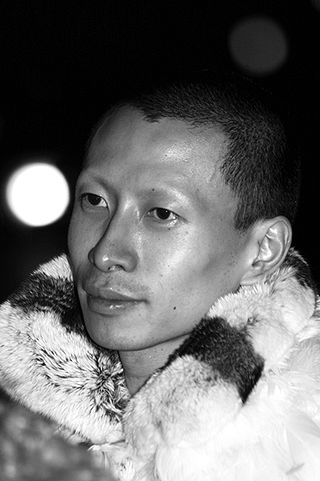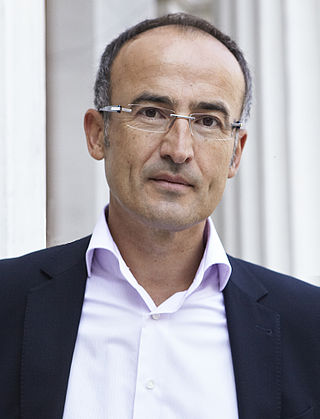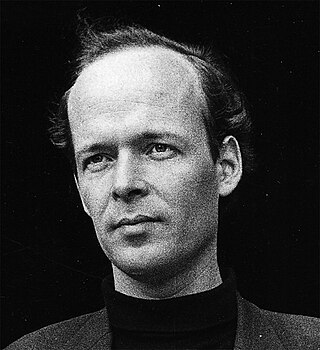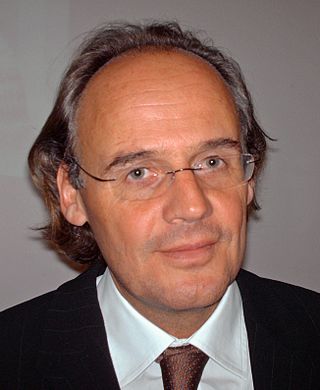Related Research Articles

Wolfgang Tillmans is a German photographer. His diverse body of work is distinguished by observation of his surroundings and an ongoing investigation of the photographic medium’s foundations.

The Temple of Zeus at Olympia was an ancient Greek temple in Olympia, Greece, dedicated to the god Zeus. The temple, built in the second quarter of the fifth century BC, was the very model of the fully developed classical Greek temple of the Doric order.

The Boxer at Rest, also known as the Terme Boxer, Seated Boxer, Defeated Boxer, or Boxer of the Quirinal, is a bronze sculpture, a Hellenistic Greek original, of a sitting nude boxer at rest, still wearing his himantes, a type of leather hand-wrap. It has been given various dates within the period of about 330 to 50 BC. It was excavated in Rome in 1885, and is now in the collection of the National Museum of Rome, normally displayed in the Palazzo Massimo alle Terme.

The Schirn Kunsthalle is a Kunsthalle in Frankfurt, Germany, located in the old city between the Römer and the Frankfurt Cathedral. The Schirn exhibits both modern and contemporary art. It is the main venue for temporary art exhibitions in Frankfurt. Exhibitions included retrospectives of Wassily Kandinsky, Marc Chagall, Alberto Giacometti, Bill Viola, and Yves Klein. The Kunsthalle opened in 1986 and is financially supported by the city and the state. Historically, the German term "Schirn" denotes an open-air stall for the sale of goods, and such stalls were located here until the 19th century. The area was destroyed in 1944 during the Second World War and was not redeveloped until the building of the Kunsthalle. As an exhibition venue, the Schirn enjoys national and international renown, which it has attained through independent productions, publications, and exhibition collaborations with museums such as the Centre Pompidou, the Tate Gallery, the Solomon R. Guggenheim Museum, the Hermitage Museum, or the Museum of Modern Art.

Terence Koh is a Canadian artist who has also worked under the alias "asianpunkboy". The artist's work spans a range of media, including drawing, sculpture, video, performance, and the internet. Originally working under the alias asianpunkboy, Koh designed zines and custom-made books. His recent work has expanded to include durational performances, complex installations, and the exploration of natural ecosystems. Much of his diverse work involves queer, punk, and pornographic sensibilities. In 2008, he was listed in Out magazine's "Out 100 People of the Year".

Peter Saul is an American painter. His work has connections with Pop Art, Surrealism, and Expressionism. His early use of pop culture cartoon references in the late 1950s and very early 1960s situates him as one of the fathers of the Pop Art movement. He realised about 800 paintings during his career.

Jeffrey Lynn Koons is an American artist recognized for his work dealing with popular culture and his sculptures depicting everyday objects, including balloon animals produced in stainless steel with mirror-finish surfaces. He lives and works in both New York City and his hometown of York, Pennsylvania. His works have sold for substantial sums, including at least two record auction prices for a work by a living artist: US$58.4 million for Balloon Dog (Orange) in 2013 and US$91.1 million for Rabbit in 2019.

Tobias G. Natter is an Austrian art historian and internationally renowned art expert with a particular expertise in "Vienna 1900".
Beate Gütschow is a contemporary German artist. She lives and works in Cologne and Berlin.

The Liebieghaus is a late 19th-century villa in Frankfurt, Germany. It contains a sculpture museum, the Städtische Galerie Liebieghaus, which is part of the Museumsufer on the Sachsenhausen bank of the River Main. Max Hollein was the director from January 2006 to 2016, followed by Philipp Demandt.

Gerhard von Graevenitz was a German kinetic artist, co-founding member of the Nouvelle Tendance and member of the op-art movement. He also belonged to the international circle of the Zero-Group. He is seen as one of the uncompromising representatives of the constructive-concrete art of the younger generation.

Gods in Color or Gods in Colour (original title in German: Bunte Götter – Die Farbigkeit antiker Skulptur is a travelling exhibition of varying format and extent that has been shown in multiple cities worldwide. Its subject is ancient polychromy, i.e. the original, brightly-painted, appearance of ancient sculpture and architecture.

Michael Jackson and Bubbles is a porcelain sculpture by the American artist Jeff Koons. It was created in 1988 within the framework of his Banality series.

Tobias Rehberger is a German sculptor, born in Esslingen am Neckar. He studied under Thomas Bayrle and Martin Kippenberger at the Stadelschule in Frankfurt am Main, where he now teaches.

Max Hollein is an Austrian art historian and the current Director of the Metropolitan Museum of Art in New York City. He served as Director and CEO of the Fine Arts Museums of San Francisco from July 2016, until April 2018, the Metropolitan Museum of Art announced that Hollein would become its 10th director.

Vinzenz Brinkmann is a German classical archaeologist.

Balloon Dog is a series of sculptures by the American artist Jeff Koons. There are different versions of this sculpture, made between 1994 and 2000, with each having a different color: blue, magenta, yellow, orange and red.
Kuehn Malvezzi is an architectural practice in Berlin founded by Johannes Kuehn, Wilfried Kuehn and Simona Malvezzi in 2001. They work as exhibition designers, architects and curators, with a focus on museums and public spaces.
Lena Henke is a German sculptor, photographer and installation artist.
The Hellenistic Prince, Seleucid Prince, or Terme Ruler is a Greek bronze statue, 204 centimetres high, made in the 2nd century BC, now in the collections of the Palazzo Massimo alle Terme in Rome. It was found in 1885, together with the Boxer at Rest, on the Quirinal Hill, probably near the Baths of Constantine during the construction of the National Theatre. The two statues were however not part of an ensemble, being of different dates. There are significant debates on who is the person pictured, the original attribution to a Hellenistic prince being now rejected in favour of a Roman general—possibly Scipio Aemilianus, although there have been other suggestions.
References
- ↑ Cf. Vinzenz Brinkmann: Jeff Koons – The Sculptor. Exh.Cat. "Jeff Koons, the Painter & the Sculptor", Liebighaus Skulpturensammlung, Schirn Kunsthalle Frankfurt, 20 June - 23 September 2012, Ostfildern 2012, p. 109.
- ↑ Jeff Koons at the Serpentine Gallery, article by Robin Blake (July 4, 2009). Retrieved on April 2, 2013.
- ↑ notification of the PinchukArt Centre Archived 2016-02-28 at the Wayback Machine , (March 29, 2012). Retrieved on April 3, 2013.